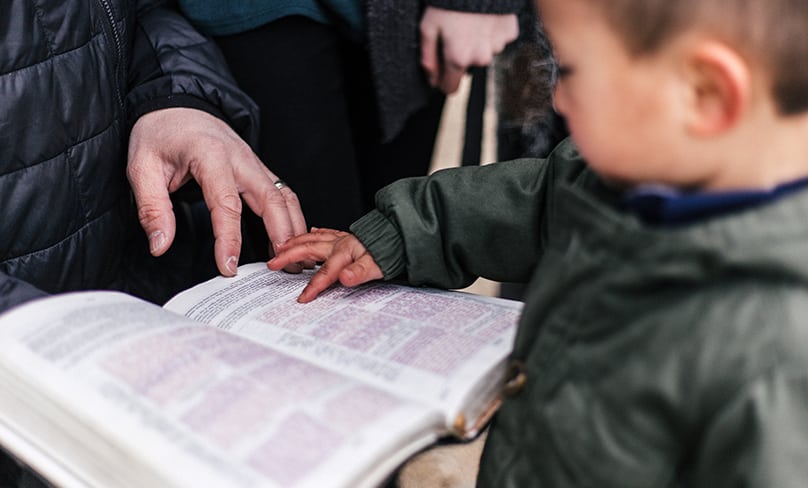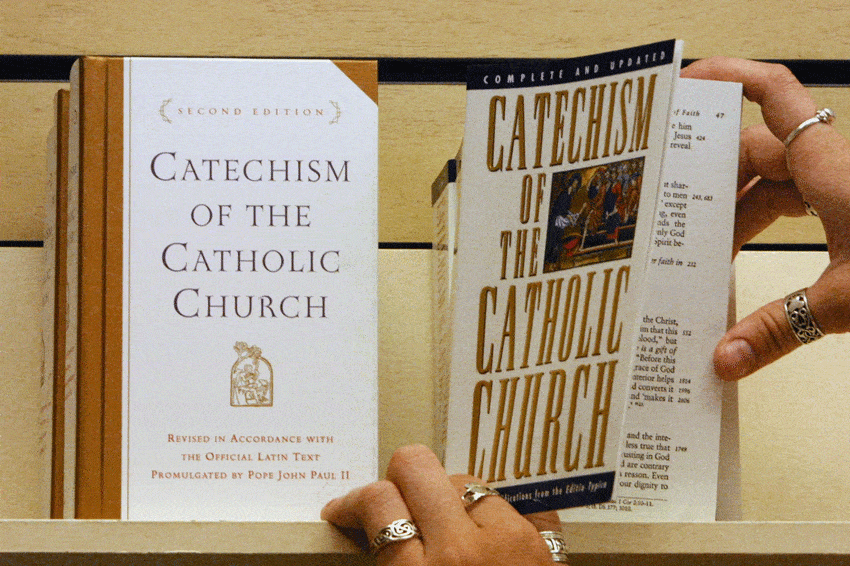
By Francis Etheredge
My parents found it very difficult to pray with us and, in the end, abandoned it; however, they still prayed for their seven children and, I am certain, returning to the Catholic Faith at forty was a direct result of their prayers and the prayers of many other people.
While thinking, yet again, of suicide, as an endless sequence of relationships went nowhere, courses and jobs changed fruitlessly, vocational guidance came to nothing, leaving and returning home was an unshakeable pattern of optimism and failure, there seemed to be little point in continuing; however, in a way different to all other moments, I was by now studying theology and had just read the Catechism of the Catholic Church, which said: “If God can bring creation to exist out of nothing He can make a new beginning for the sinner” (CCC, 298). This moment expressed an unprecedented power of the word of God and founded a change which rapidly showed itself in realising that I was called to marriage and not to the priesthood or to the religious life, to a chaste courtship and to marriage.
What follows, then, is a brief account of what turned me into a father-catechist and a few moments from my experience of twenty-five years of marriage!
The help we need. Both my wife and I are members of the Neocatechumenal Way and, when it came to marriage, Fr. Tony Trafford, who is now an itinerant catechist in Australia, was an indispensable help to me with counsel and confession. What parents need is, first and foremost, an ongoing formation in the Christian Faith which sustains us in the vocation to seek the help of God in marriage, in family life and in all that unfolds in our lives. On the basis of our ongoing foundation in the Way there are three helps, all of which presuppose that the father lives the changes to which he is called in becoming a servant of the family: adapting what we say to the age and experience of our children; sharing the reality of life as it is lived; and the word of God, whether in the book of nature or the Scriptures.

Adaptation. It may seem simple but studying at home meant that it seemed as if the children’s coming home from school was an intrusion into a shortening day; and, therefore, being able to accept and welcome their return was a major grace of God which went with other graces, such as being willing to drive them around as “time together” instead of resenting the “time out” from my own plans. In the house there is a constant conversion, to which Lent continually calls me afresh, to pick up shoes, dropped towels, clothes and scattered bits and pieces instead of regaling them with lists of unfinished tidying!
Adaptation applies, significantly, to how prayer is introduced, questions are answered, and reasons are given for the reality of the Christian life. In an electronic age it makes sense, at times, to refer to prayer as more instantaneous than light, a message on the phone or even an imaginative journey as God is present in the very roots of the prayer and its relationship to our lived life. Once, when I was shopping with our three eldest children, who were very young then, as we came round a flower stall one of them was gone! In a moment of pure peace, I prayed and looked around: the oldest girl was being led through the checkout by a stranger – I called twice, louder the second time, and the child was released and came back to me. Naturally we will never know what “could” have happened, but I constantly thank God that I prayed rather than panicked and rushed all over the place while, without knowing it, she would have been gone.
Sharing the reality of life as it’s lived. While I was again trying to study, exhausted and, at times, simply lying on the floor and praying about the fact that I never earnt enough, seemed well enough or could learn enough, and yet our family was growing and we needed a home of our own instead of the rooms we had in my mother’s house, my father having died unexpectedly from an operation on his back that went wrong. The answer, as unwelcome as it was unexpected, was the news that my mother was going to sell the house next year; and, in one month, it was sold. I accepted, with the help of the word of God, our catechists in the Neocatechumenal Way and our own community, that this was the will of God and an answer to prayer; and, therefore, after three moves we ended up in the council house in which we have now lived for over eighteen years, making the third move when our fifth child was just born!
So, this was a “watershed” moment to which I refer, frequently, as God bringing good out of yet another difficulty and crisis. Another one was when I had thought I had finished studying and I needed work; and, while studying the “Our Father”, I felt prompted to pray for work: “Give us this day our daily bread” and did so, regularly, at our local Catholic Church. Within a few months I was given a job with a Catholic institute which combined administration with teaching and writing and, in due course, further study.

The word of God in the Scriptures. One of the first words that was a particular help to Sunday Lauds, the Morning Prayer with the children in the home, was from the Book of Samuel; we had taken advice and, as the children got older, we took excerpts from the beginning of the Holy Bible onwards. So, having got as far as the book of Samuel we came upon this reading: that the sons of Eli, the priest at the temple at Shiloh, were stealing the portion of the Lord that the people brought as an offering to God when they came on pilgrimage to pray (see: 1 Samuel, 2: 12-36). This word struck me in two-fold way: that the more I responded to the silliness of our children the more I disrupted Morning Prayer and the more I compounded their own inability to listen and to concentrate. So my wife and I began to pray a decade of the rosary as a part of our preparation; and, in addition, little by little, we focused more and more on the word and what it meant to us, beginning with my wife and I.
At the same time, then, as viewing the problems we encountered as a sign of my poor relationship with them, I made more changes in what I did with them and how I spoke, using more familiar images when it came to introducing the need to listen, such as what if a famous footballer came, a pop star, an author, to tell us a word that could help us and here was God speaking to us! Thus, as so often was the case, the word came to change me when I thought it needed to change the children!
The word of God in the book of nature. Scripture is full of human experience and opens, directly or indirectly, on every situation in life; however, it also draws on innumerable events and images from the natural world. Thus, along with the everyday event of seeing the children off to school in the morning and noticing some of the many “moments” of nature, like the vertical spider webs, the mountain climbing snails, hanging precariously but firmly off the top of tall plants, and the intricacies of what makes soil – there is the constant possibility of turning our thoughts to the organisation of nature, her beauty, the subtly of the myriad interactions of gravity, elements, rotting vegetables, electricity in the ground and the growth of plants and the marvellously coherent harmony of colours, shapes and functions, materials and their properties. In other words, whether as the starting point of a parable of growth needing support, nourishment and a suitable environment, or as a stepping stone, literally, to thinking about the existence of God and His work, nature is an inexhaustible resource – even if, at times, the questions are challenging about why there are disasters and wars!

We benefit from a community. While, it seems, we are called upon so often to seek the help of God, with ourselves, our children and the world in which we live, we do not do so alone; even if, at times, there is a real aloneness with God when we seem to suffer in ways that others do not understand or cannot grasp. Thus being a part of the Neocatechumenal Way has brought us into contact with many other people, single, divorced, other families and places; and, therefore, in our vocation to be married and parents we have been on many days, weekends, pilgrimages, both with and without our children, both our children with and without us, so that life has been full, very full, and goes on being full and spilling over in the witness we can give that God comes to give life and life to the brimming fullness (see Jn 10: 10).
Mr. Francis Etheredge is a Catholic layman, married with eight children, plus three in heaven and a writer. More about this life in The Prayerful Kiss, Honest Rust and Gold, Within Reach of You, The Family on Pilgrimage: God Leads Through Dead Ends and other books. He has earned a BA Div (Hons), MA in Catholic Theology, PGC in Biblical Studies, PGC in Higher Education, and an MA in Marriage and Family (Distinction).
